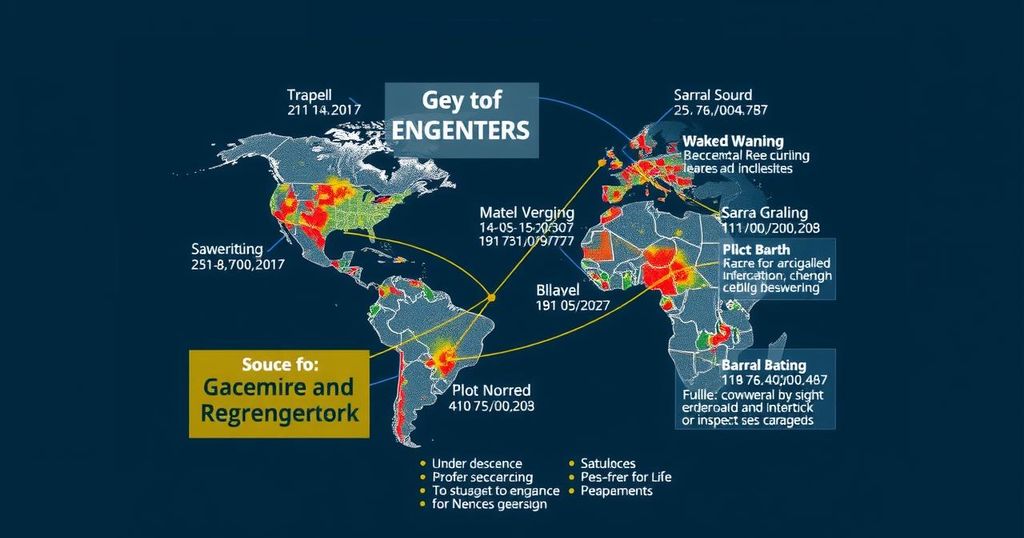Introducing an Ethical Framework to Guide Geoengineering Research
In response to increasing interest in geoengineering as a solution to climate change, the American Geophysical Union (AGU) has launched an ethical framework designed to guide responsible research and decision-making. This framework emphasizes the importance of ethical considerations in large-scale climate interventions, aiming to foster inclusive dialogue and address potential risks. It articulates five fundamental principles to govern climate intervention research: Responsible Research, Holistic Climate Justice, Inclusive Public Participation, Transparency, and Informed Governance, underscoring the need for accountability and collaboration in the face of environmental challenges.
As the global focus on geoengineering as a potential solution to climate change intensifies, the American Geophysical Union (AGU) has introduced an ethical framework aimed at guiding responsible practices and facilitating inclusive discussions surrounding this controversial field of research. This framework, developed with insights from a global panel of experts, emphasizes the necessity for any large-scale climate intervention efforts to adhere to ethical principles that allow society to make well-informed decisions regarding their implementation, especially given the significant uncertainties associated with potential unintended consequences. AGU President Lisa J. Graumlich stressed the urgency of addressing climate change, asserting that while tackling carbon emissions remains paramount, the increasing pressure for large-scale geoengineering interventions necessitates a framework that prioritizes inclusivity and equity, carefully weighing risks against benefits. Carlos Nobre, a leading researcher and member of the framework’s advisory board, highlighted the diverse challenges faced by global communities, underscoring the importance of an ethical foundation to foster collaborative efforts in combating climate change. The report, entitled “Ethical Framework Principles for Climate Intervention Research,” proposes a set of globally recognized ethical guidelines to steer the direction of research, funding, and policy initiatives. This document draws on established practices developed for other emerging fields that entail significant unknowns, such as biotechnology and genetic engineering. The harsh reality is that despite commitments made in the 2015 UN Paris Agreement to limit global temperature increases to 1.5 degrees Celsius, rising emissions threaten to exacerbate climate-related disasters and precipitate critical environmental tipping points, such as irreversible changes in ecosystems. Geoengineering, defined as deliberate attempts to modify the climate system on a large scale to mitigate climate change, encompasses various techniques, including carbon dioxide removal and solar radiation modification. However, AGU’s Interim Executive Director, Janice R. Lachance, reinforced that these interventions should complement, but never replace, efforts to reduce greenhouse gas emissions. Developed over two years with extensive input from international experts and stakeholders, the ethical framework delineates five key principles to govern climate intervention research: Responsible Research, Holistic Climate Justice, Inclusive Public Participation, Transparency, and Informed Governance. These principles are designed to ensure that the complexities of socio-economic disparities and environmental impacts are fully considered before any initiatives are undertaken. The framework calls for research to involve voices from those communities most affected by climate change and commits to upholding ethical standards across all facets of climate intervention research.
The ethical implications of geoengineering are increasingly recognized as critical amidst the urgent climatic challenges facing the globe. Geoengineering refers to deliberate efforts to alter the Earth’s climate system, often viewed as a last resort to mitigate the impacts of climate change. However, concerns regarding the potential risks, unintended consequences, and ethical considerations necessitate a structured approach to such research. The introduction of the ethical framework by AGU represents a proactive attempt to shape the discourse around geoengineering, ensuring that solutions are equitable and considerate of all communities affected by climate change.
The establishment of an ethical framework for geoengineering research is a significant step toward ensuring that such interventions are approached responsibly and equitably. With climate change posing an existential threat to the planet, the principles outlined by AGU serve as critical guides for researchers, policymakers, and funders alike. As we reflect on these new ethical guidelines, it becomes evident that a holistic and inclusive approach must underpin any initiatives aimed at modifying our climate. The AGU’s effort underscores the necessity of accountability and collaboration to protect vulnerable communities while addressing the urgent challenges of climate change.
Original Source: phys.org




Post Comment